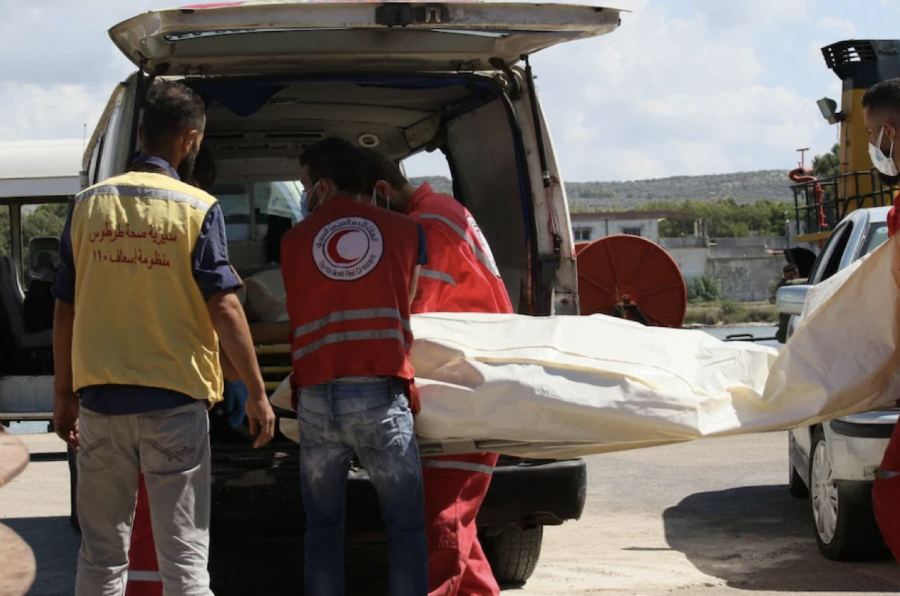Syrian and Lebanese migrants die in boat sinkage amidst political and economic upheaval
September 30, 2022
A small wooden boat carrying 120 to 150 Syrian and Lebanese migrants took off from Lebanon on its way to Cyprus on Sept. 23. The boat made it to the Syrian city of Tartus, around 70 nautical miles from its starting point before sinking. There is no official cause for the sinking, however, considering the boat’s relatively small size and poor structure, it appears not to have been able to accommodate such a large capacity.
At least 86 people have died from the attempted trip, many of whom are children and the elderly. Trips like this are not feasible for most families, costing about $1,000 USD per person.
The Syrians aboard were originally refugees in Lebanon, escaping the ongoing tragic war occurring in their home country. They were intending to migrate once again with their Lebanese counterparts to escape the current economic crisis that unfolded in 2019. The declining condition in Lebanon quickly became apparent with the emergence of the COVID-19 pandemic and the 2020 Beirut Port explosion.
In Syria in 2011, protests demanding democratic reform began which resulted in violent crackdowns by the government. The conflict between the people and the government caused a major civil war in the nation. The war in Syria is one that was instigated by major powers, though they were not physically involved, but rather “sponsored” the decisions of the war. Foreign powers such as Russia, eager to maintain their influence in the Middle East, sided with the Syrian government, while the United States, deploying its own forces into the conflict, supported Syrian pro-democracy groups.
Due to government opposition to democracy as well as foreign interference, over 80 percent of Syrian civilians are living beneath the poverty line with staggeringly low amounts of food and medicine. Many die in tragic ways, their homes being destroyed, schools being bombed and historical Syrian landmarks being destructed. More than 13,000 children have died since the start of the war and almost seven million Syrian refugees have fled to neighboring countries such as Turkey, Jordan, Egypt and Lebanon. Moving to Lebanon was a sigh of relief for many and a time to rebuild their lives, knowing their real home is a war zone.
The relief they felt moving to Lebanon soon erupted into panic once again, as they are currently facing a major economic collapse. This is, according to University Economics professor Dr. Anna Shostya, “…a collapse of the financial and banking system, [the] governments inability to finance its debt and… inability to borrow money, a tsunami of… bankruptcies and foreclosures, [a] decline in trade and a strong possibility of political upheaval.”
The country is currently $100 billion in debt, which caused tight withdrawing restrictions primarily affecting lower and middle-class account holders in the country. During this, the Lebanese currency lost 95 percent of its value. People have become so desperate that some are resorting to “robbing” their own banks hoping to get a hold of their money.
When asked how Lebanon’s current economic state could affect the international world, Dr. Shostya said, “According to the World Bank, Lebanon exports gold, diamonds, jewelry and scrap metal to mainly Switzerland, United Arab Emirates, Saudi Arabia and the United States. It also imports petroleum oils, medicaments and other products from the United States, Greece, Turkey and China.”
“The decline in trade associated with Lebanon’s economic crisis will affect the world’s prices of these products and will make the stuff that Lebanon produces more expensive…. Lack of imports, in return, will incapacitate the Lebanese economy even further as these imports are inputs for other goods that Lebanon needs to produce. Particularly devastating to the Lebanese economy will be its inability to borrow money from international sponsors, such as the IMF (International Monetary Fund).”
“We live in a very interconnected world,” said Dr. Shostya, giving advice to American students. “A crisis in one economy would have a ripple effect on others. A modern American student should be aware not only of how our own economy works but also of major international events and dynamics that affect the rest of the world. Being a responsible, cognizant and broad-minded citizen involves the knowledge of global cataclysmic events and the way they may affect our lives,” she advised.
This crisis is creating Lebanese refugees in combination with the already existing Syrian refugees, which almost never existed prior to this devastation. Even middle-class individuals in Lebanon, who previously had no difficulty with money, are unable to see a future in Lebanon and are organizing ways to migrate to other countries. The two devastations in both Syria and Lebanon are entirely different but result in the same outcome: They must flee to survive.













